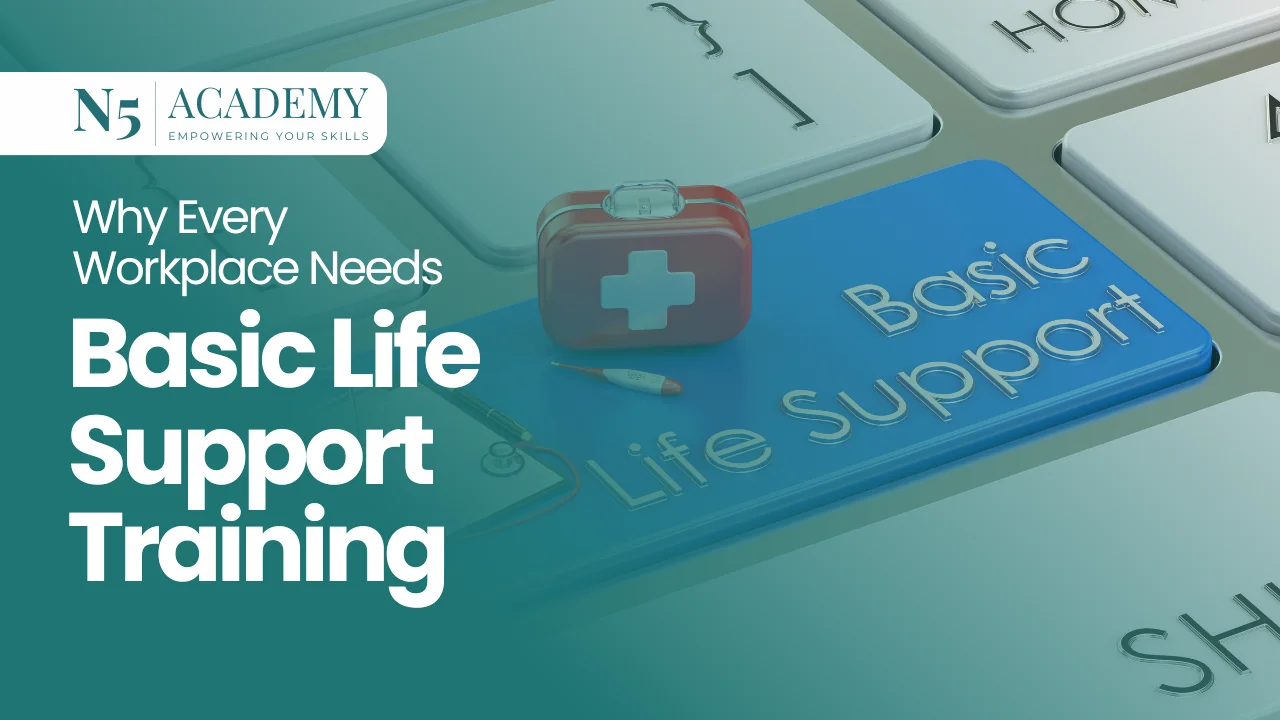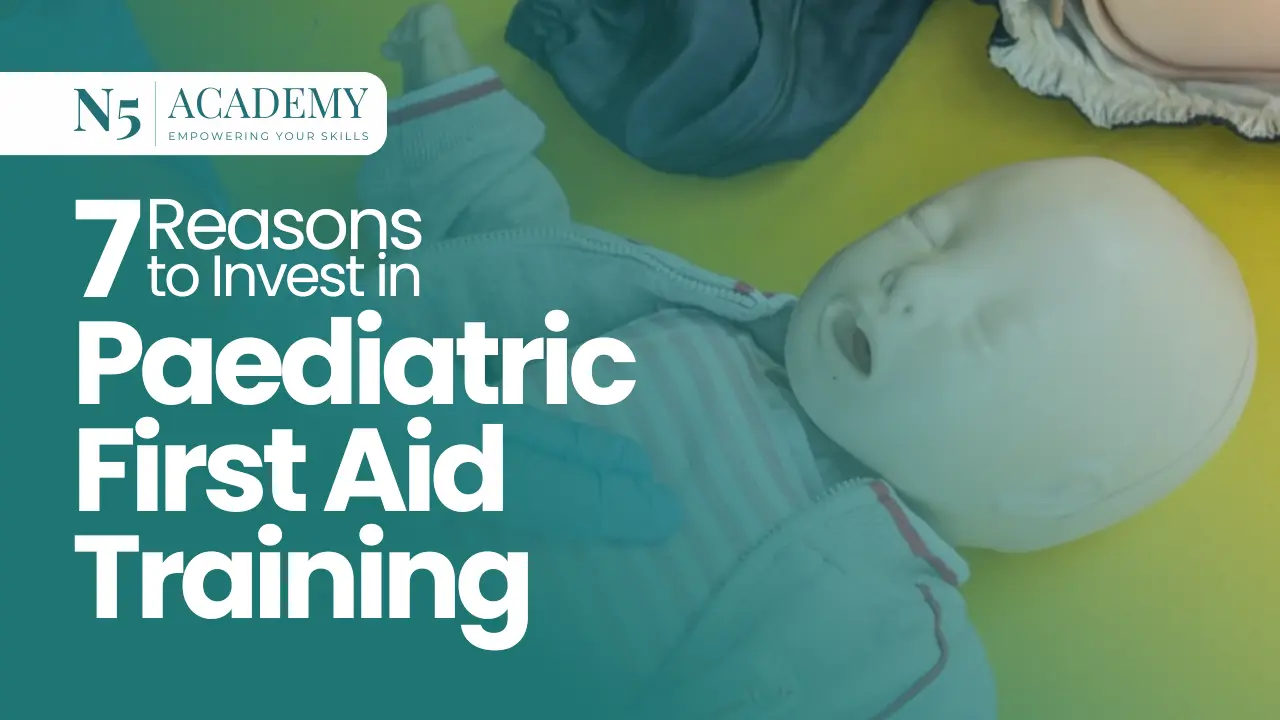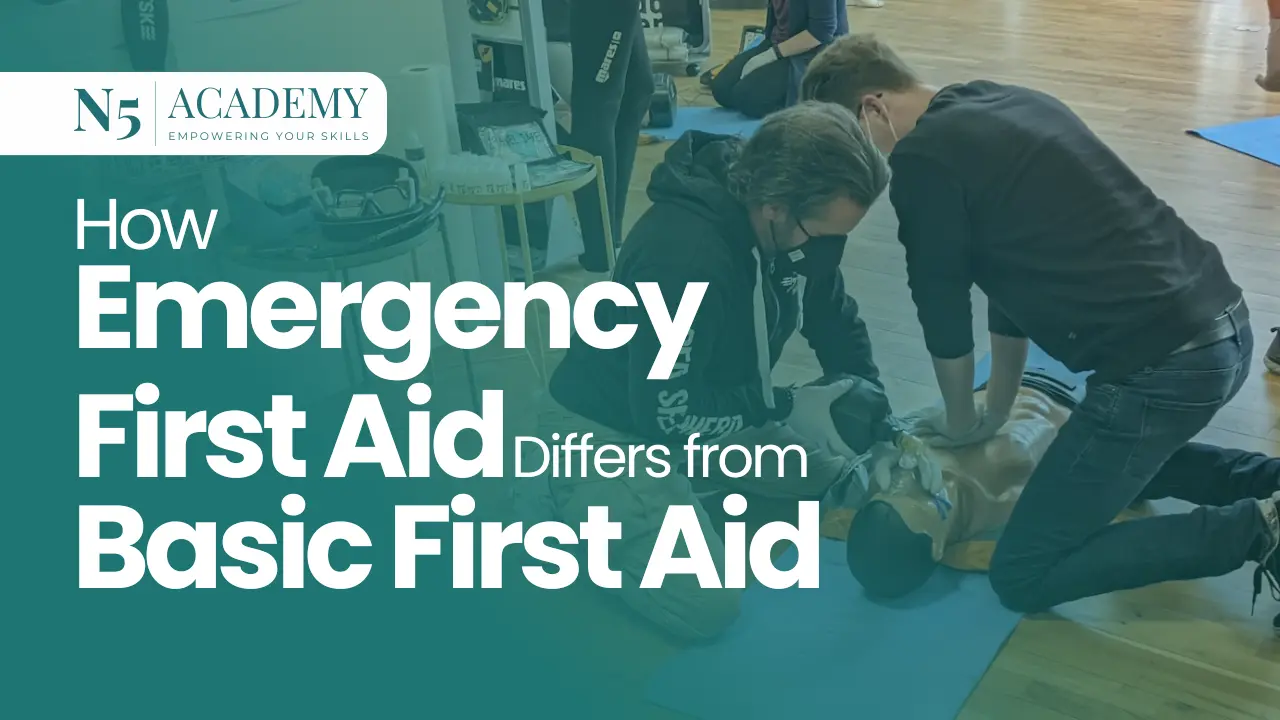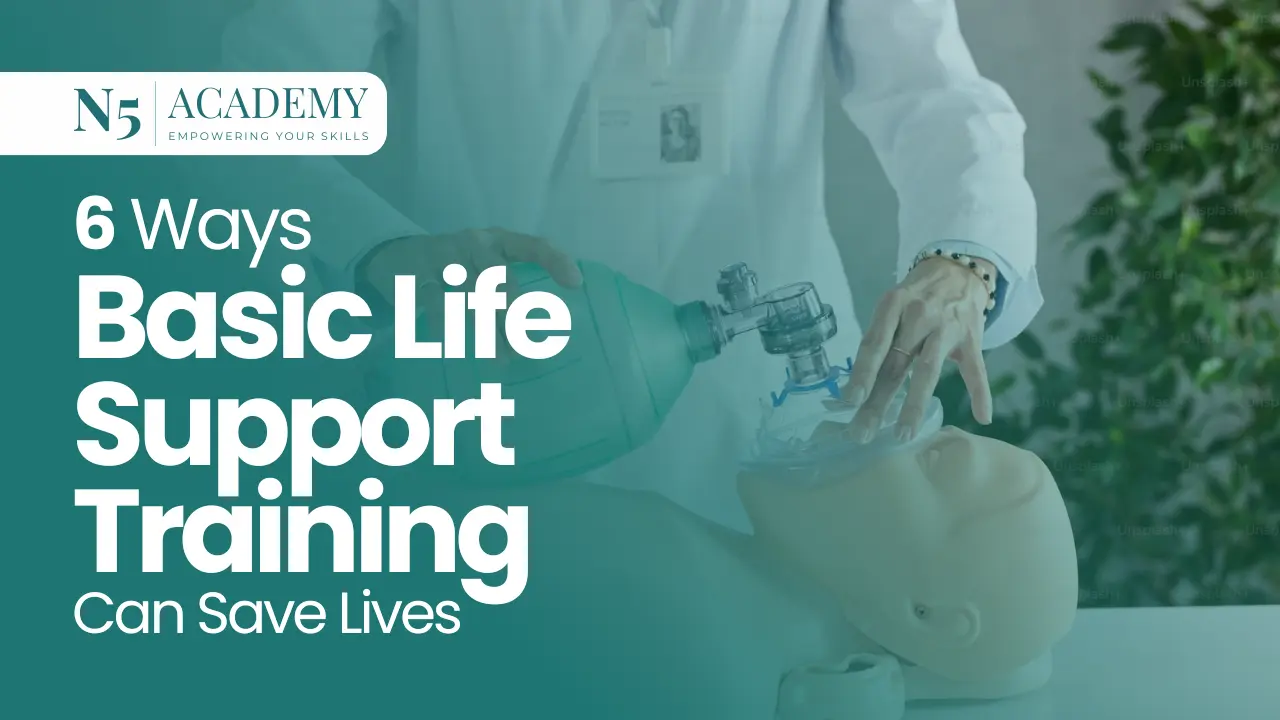Emergencies can happen without warning. A normal Tuesday morning at work can quickly become serious if someone collapses, has a seizure, or goes into cardiac arrest. In these moments, Basic Life Support (BLS) training can save lives. Acting quickly and correctly in the first moments of a medical emergency greatly increases a person’s chance of survival and recovery.
Every workplace needs to ensure that employees have these essential skills. BLS training is crucial for building a strong health and safety culture and shows a real commitment to employee well-being. Whether in busy offices, construction sites, retail stores, or schools, BLS training helps create environments where lives can be saved before professional help arrives.
N5 Academy knows how important it is to have safe and responsive workspaces. That’s why we provide comprehensive health and safety training, including Basic Life Support and Emergency First Aid courses. These programs are designed to be easy to understand for all employees, no matter their background.
What Is Basic Life Support (BLS)?
Basic Life Support (BLS) is essential medical care for people in life-threatening situations like cardiac arrest, breathing problems, or blocked airways. Its goal is to keep blood and oxygen flowing until advanced medical help arrives. BLS methods are based on research and are endorsed by international medical organisations like the Resuscitation Council UK.
The core components of BLS include:
- Recognising emergencies quickly and accurately.
- Performing CPR (Cardiopulmonary Resuscitation) using correct techniques.
- Use an AED (Automated External Defibrillator) when available.
- Clearing blocked airways and providing rescue breaths.
- Placing individuals in the recovery position when appropriate.
BLS training is easy to understand and can save lives. You don’t need a medical degree or health background, just a desire to learn, stay calm in stressful situations, and show kindness.
Why Is Workplace BLS Training So Crucial?
Workplaces are complex environments where people of different ages and health backgrounds work together for long hours. Whether it’s stress in an office or hard work in construction or logistics, health problems can arise at any time. This makes workplaces likely places for medical emergencies.
Some compelling reasons why workplace BLS training is essential:
- Immediate response saves lives: In cardiac arrest cases, the first 3–5 minutes are crucial. Giving CPR during this time can double or triple survival chances.
- Reduces severity of incidents: Quick, informed actions can stop complications like brain damage or breathing problems.
- Boosts confidence: When employees learn first aid, they feel empowered and less dependent on outside help.
- Strengthens teamwork: Training together helps teams work better under pressure and improves communication and camaraderie.
BLS training prepares your staff to respond quickly to emergencies before ambulances get there.
Legal and Ethical Responsibilities for UK Employers
In the UK, the Health and Safety (First-Aid) Regulations 1981 require employers to have enough first-aid supplies, facilities, and trained staff. Every employer, no matter the size, must check workplace risks and set up proper emergency response systems.
Your legal responsibilities include:
- Choose trained first aiders who can manage common emergencies.
- Offer emergency response training that fits your business needs.
- Make sure all first aid supplies are kept up-to-date.
- Maintain accurate records of incidents and employee training.
Not meeting these obligations can lead to legal penalties, insurance issues, damage to your reputation, and, most importantly, loss of life. Ethically, prioritising BLS training demonstrates to employees and customers that you care about their safety and are ready for emergencies.
Real-Life Scenarios Where BLS Training Helped
1. Cardiac Arrest in a Call Centre
In a busy UK call centre, a 42-year-old worker suddenly collapsed at their desk. Luckily, a co-worker who had just completed basic life support training started chest compressions right away, while another person got the AED. Paramedics later said that this quick action was crucial for saving the person’s life.
2. Choking Incident at a Lunch Break
A warehouse worker started choking during lunch. A trained co-worker quickly recognised the problem, performed back blows and abdominal thrusts, and cleared the blockage before help arrived. It took less than two minutes, but it saved the worker’s life.
3. Public Collapse in a Retail Store
In a Birmingham retail store, a customer suddenly fainted near the checkout. The staff, trained in first aid by N5 Academy, acted quickly by performing CPR and calling emergency services, keeping the customer stable until paramedics arrived.
These stories are not uncommon. They show how BLS training enables ordinary people to act heroically in emergencies.
Boosting Team Morale and Company Culture
Employees feel safer and more valued when their employer prioritises health and safety. Providing first aid training goes beyond just meeting legal requirements; it boosts morale. Here’s how BLS training improves your workplace culture:
- Builds trust and loyalty: When employees see that you care about their well-being, they are more likely to stay motivated and loyal.
- Encourages teamwork: Training together helps improve communication and understanding between departments.
- Fosters leadership: Trained employees are more likely to take charge during medical emergencies and other crises.
- Enhances reputation: A brand focused on safety attracts top talent and keeps clients.
BLS training helps improve mental health. When the team knows how to handle a crisis, it reduces fear and anxiety.
The Link Between Emergency Response Training and Productivity
Emergency response training might not seem linked to workplace performance at first, but it actually boosts productivity in several ways:
- Fewer disruptions: Quick responses to health issues lead to less downtime and reduce stress during emergencies.
- Higher engagement: Employees who feel safe are more focused and dedicated to their work.
- Greater responsibility: When staff know how to manage medical situations, they become more aware of their role in keeping the workplace safe.
- Better crisis management: Employees trained in first aid often do well in other emergency situations, like fire drills or evacuations.
Investing in BLS training isn’t just for emergencies; it helps build a calm, ready, and strong workforce.
What Is Included in Workplace BLS Training?
At N5 Academy, our basic life support training in London meets the needs of today’s workplaces and follows UK safety rules. The course usually includes:
- How to assess and approach emergency situations.
- CPR for adults, children, and infants.
- Effective use of an AED and understanding defibrillation protocols.
- Choking prevention and treatment techniques.
- Managing unresponsive casualties and placing them in recovery positions.
- Legal considerations and reporting procedures.
Our sessions are practical and focused on real situations. This helps your team learn not just the theory but also how to respond under pressure.
Choosing the Right First Aid Course for Your Staff
Every organisation has different needs based on its industry, size, and risk level. That’s why N5 Academy offers expert help in choosing the right training course:
- Basic Life Support Training: This training is great for all staff, especially those who work with the public or lead teams.
- Emergency First Aid at Work Course in Romford: This one-day course teaches how to handle bleeding, fractures, burns, and other serious situations, along with Basic Life Support.
- First Aid at Work Course: This course covers Basic Life Support and full workplace first aid, making it perfect for high-risk areas.
Need help deciding? We can evaluate your business needs and create a program that suits your schedule, team size, and compliance goals.
How Often Should Staff Be Trained?
Skills can weaken over time, and for life-saving actions, confidence matters as much as knowledge. That’s why ongoing education is essential. The Resuscitation Council UK recommends annual refresher training and renewing full certification every three years.
Regular workplace BLS training ensures:
- Employees are familiar with the latest guidance and equipment.
- Muscle memory is developed for faster reaction times.
- New staff are brought up to speed.
- A culture of preparedness is maintained long-term.
We suggest adding BLS training to your health and safety policy. This will ensure that everyone receives regular, documented training.
Who Should Receive BLS Training in the Workplace?
Some jobs need BLS certification, like health and safety officers or team leaders, but all employees can benefit from it. Emergencies can happen to anyone, regardless of their job title.
Key groups that should definitely receive training include:
- Managers and supervisors oversee teams.
- Human resource professionals focus on workplace wellbeing.
- Frontline staff work in retail, hospitality, and customer service.
- Field operatives and warehouse staff face physical hazards.
- Security and facilities management teams ensure safety.
Training staff in all departments creates a safety net that protects everyone, including clients and visitors.
What Makes N5 Academy the Right Choice?
Trust is important for health and safety. That’s why many organisations in the UK choose N5 Academy for emergency response training. Here’s what makes us different:
- Expert trainers: Our instructors are certified professionals with real emergency experience.
- Customizable content: We tailor our courses to match your workplace risks.
- Flexible formats: You can choose on-site, off-site, or a mix of classroom and online learning.
- Accredited courses: Our courses meet HSE and Resuscitation Council UK standards.
- Post-training support: We provide refresher tools, printed guides, and practice checklists after training.
Join the UK businesses that have wisely chosen to invest in useful, engaging, and effective workplace BLS training.
How to Get Started
If you’re ready to prioritise safety and equip your team with life-saving skills, the process couldn’t be easier:
- Check out our Basic Life Support Training page for course options and prices.
- Choose a date, location, or delivery method that works for you.
- Reach out to our helpful team for discounts on group bookings or custom training.
- Look into our Emergency First Aid at Work training to create a complete safety plan.
We help you include these courses in your health and safety documents and emergency plans.
Training That Saves Lives
BLS training is essential for all organisations, from tech startups to schools, factories, and retail chains. They must be ready to handle emergencies quickly and confidently.
BLS training saves lives and creates a strong workplace. It increases employee involvement and promotes a culture of health and safety. Being able to respond well in emergencies shows leadership and care for others.
Whether it’s doing CPR or knowing how to help someone who faints, BLS training provides important skills for everyone. Make BLS training a key part of your safety plan today. N5 Academy can help you get started.






